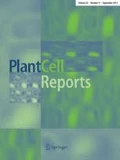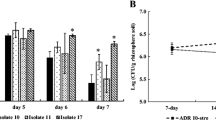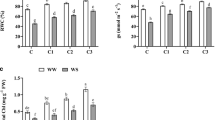Abstract
Key message
A detailed study of the response of wheat plants, inoculated with drought-tolerant PGPR is studied which would be beneficial to achieve genetic improvement of wheat for drought tolerance.
Abstract
Drought stress, a major challenge under current climatic conditions, adversely affects wheat productivity. In the current study, we observed the response of wheat plants, inoculated with drought-tolerant plant growth-promoting rhizobacteria (PGPR) Bacillus megaterium (MU2) and Bacillus licheniformis (MU8) under induced drought stress. In vitro study of 90 rhizobacteria exhibited 38 isolates showed one or more plant growth-promoting properties, such as solubilization of phosphorus, potassium, and exopolysaccharide production. Four strains revealing the best activities were tested for their drought-tolerance ability by growing them on varying water potentials (− 0.05 to − 0.73 MPa). Among them, two bacterial strains Bacillus megaterium and Bacillus licheniformis showed the best drought-tolerance potential, ACC deaminase activities, IAA production, and antagonistic activities against plant pathogens. Additionally, these strains when exposed to drought stress (− 0.73 MPa) revealed the induction of three new polypeptides (18 kDa, 35 kDa, 30 kDa) in Bacillus megaterium. We determined that 106 cells/mL of Bacillus megaterium and Bacillus licheniformis were enough to induce drought tolerance in wheat under drought stress. These drought-tolerant strains increased the germination index (11–46%), promptness index (16–50%), seedling vigor index (11–151%), fresh weight (35–192%), and dry weight (58–226%) of wheat under irrigated and drought stress. Moreover, these strains efficiently colonized the wheat roots and increased plant biomass, relative water content, photosynthetic pigments, and osmolytes. Upon exposure to drought stress, Bacillus megaterium inoculated wheat plants exhibited improved tolerance by enhancing 59% relative water content, 260, 174 and 70% chlorophyll a, b and carotenoid, 136% protein content, 117% proline content and 57% decline in MDA content. Further, activities of defense-related antioxidant enzymes were also upregulated. Our results revealed that drought tolerance was more evident in Bacillus megaterium as compared to Bacillus licheniformis. These strains could be effective bioenhancer and biofertilizer for wheat cultivation in arid and semi-arid regions. However, a detailed study at the molecular level to deduce the mechanism by which these strains alleviate drought stress in wheat plants needs to be explored.









Similar content being viewed by others
References
Abdoli M, Esfandiari E (2017) Effect of seed zinc content on vigor and seedling growth parameters of wheat grown in different levels of salinity. Int J Adv Life Sci. https://doi.org/10.26627/ijals/2017/10.02.0016
Abid M, Hakeem A, Shao Y et al (2018) Seed osmopriming invokes stress memory against post-germinative drought stress in wheat (Triticum aestivum L.). Environ Exp Bot. https://doi.org/10.1016/j.envexpbot.2017.10.002
Afridi MS, Amna S et al (2019) Induction of tolerance to salinity in wheat genotypes by plant growth promoting endophytes: Involvement of ACC deaminase and antioxidant enzymes. Plant Physiol Biochem. https://doi.org/10.1016/j.plaphy.2019.03.041
Agami RA, Ghramh HA, Hashem M (2017) Seed inoculation with Azospirillum lipoferum alleviates the adverse effects of drought stress on wheat plants. J Appl Bot Food Qual. https://doi.org/10.5073/JABFQ.2017.090.021
Ahmad Z, Waraich EA, Barutçular C et al (2020) Enhancing drought tolerance in wheat through improving morphophysiological and antioxidants activities of plants by the supplementation of foliar silicon. Phyton (B Aires). https://doi.org/10.32604/phyton.2020.09143
Ambreetha S, Chinnadurai C, Marimuthu P, Balachandar D (2018) Plant-associated Bacillus modulates the expression of auxin-responsive genes of rice and modifies the root architecture. Rhizosphere. https://doi.org/10.1016/j.rhisph.2017.12.001
Amna XY, Farooq MA et al (2020) Multi-stress tolerant PGPR Bacillus xiamenensis PM14 activating sugarcane (Saccharum officinarum L.) red rot disease resistance. Plant Physiol Biochem 151:640–649. https://doi.org/10.1016/j.plaphy.2020.04.016
Asada K (2006) Radical production and scavenging in the chloroplasts. In: Photosynthesis and the Environment
Asseng S, Guarin JR, Raman M et al (2020) Wheat yield potential in controlled-environment vertical farms. Proc Natl Acad Sci USA. https://doi.org/10.1073/pnas.2002655117
Baloch MJ, Dunwell J, Khakwani AA, et al (2012) Assessment of wheat cultivars for drought tolerance via osmotic stress imposed at early seedling growth stages. J Agric Res
Bates LS, Waldren RP, Teare ID (1973) Rapid determination of free proline for water-stress studies. Plant Soil 39:205–207. https://doi.org/10.1007/BF00018060
Beyer WF, Fridovich I (1987) Assaying for superoxide dismutase activity: Some large consequences of minor changes in conditions. Anal Biochem 161:559–566. https://doi.org/10.1016/0003-2697(87)90489-1
Buege JA, Aust SD (1978) [30] Microsomal lipid peroxidation. In: Fleischer S, Packer LBT-M in E (eds) Biomembranes—Part C: biological oxidations. Academic Press, pp 302–310
Burnison BK (1980) Modified dimethyl sulfoxide (DMSO) extraction for chlorophyll analysis of phytoplankton. Can J Fish Aquat Sci. https://doi.org/10.1139/f80-095
Cao Y, Luo Q, Tian Y, Meng F (2017) Physiological and proteomic analyses of the drought stress response in Amygdalus Mira (Koehne) Yü et Lu roots. BMC Plant Biol 17:53. https://doi.org/10.1186/s12870-017-1000-z
Carlson R, Tugizimana F, Steenkamp PA et al (2020) Rhizobacteria-induced systemic tolerance against drought stress in Sorghum bicolor (L.) Moench. Microbiol Res. https://doi.org/10.1016/j.micres.2019.126388
Danish S, Zafar-ul-Hye M (2019) Co-application of ACC-deaminase producing PGPR and timber-waste biochar improves pigments formation, growth and yield of wheat under drought stress. Sci Rep 9:5999. https://doi.org/10.1038/s41598-019-42374-9
Dhaked BS, Triveni S, Reddy RS, Padmaja G (2017) Isolation and screening of potassium and zinc solubilizing bacteria from different rhizosphere soil. Int J Curr Microbiol Appl Sci. https://doi.org/10.20546/ijcmas.2017.608.154
DuBois MA, Hamilton JK et al (2002) Calorimetric Dubois method for determination of sugar and related substances. Anal Chem 28:350–356. https://doi.org/10.1021/ac60111a017
Fahad S, Bajwa AA, Nazir U et al (2017) Crop production under drought and heat stress: plant responses and management options. Front Plant Sci 8:1147. https://doi.org/10.3389/fpls.2017.01147
Gautam S, Pandey LK, Vinayak V, Arya A (2017) Morphological and physiological alterations in the diatom Gomphonema pseudoaugur due to heavy metal stress. Ecol Indic. https://doi.org/10.1016/j.ecolind.2016.08.002
Ghosh D, Sen S, Mohapatra S (2018) Drought-mitigating Pseudomonas putida GAP-P45 modulates proline turnover and oxidative status in Arabidopsis thaliana under water stress. Ann Microbiol 68:579–594. https://doi.org/10.1007/s13213-018-1366-7
Gontia-Mishra I, Sapre S, Kachare S, Tiwari S (2017) Molecular diversity of 1-aminocyclopropane-1-carboxylate (ACC) deaminase producing PGPR from wheat (Triticum aestivum L.) rhizosphere. Plant Soil 414:213–227. https://doi.org/10.1007/s11104-016-3119-3
Gordon SA, Weber RP (1951) Colorimetric estimation of indoleacetic acid. Plant Physiol 26:192–195. https://doi.org/10.1104/pp.26.1.192
Gorin N, Heidema FT (1976) Peroxidase activity in golden delicious apples as a possible parameter of ripening and senescence. J Agric Food Chem. https://doi.org/10.1021/jf60203a043
Goswani M, Deka S (2020) Plant growth-promoting rhizobacteria—alleviators of abiotic stresses in soil: a review. Pedosphere 30:40–61. https://doi.org/10.1016/S1002-0160(19)60839-8
Gouda S, Kerry RG, Das G et al (2018) Revitalization of plant growth promoting rhizobacteria for sustainable development in agriculture. Microbiol Res 206:131–140. https://doi.org/10.1016/j.micres.2017.08.016
Gulez G, Altintaş A, Fazli M et al (2014) Colony morphology and transcriptome profiling of Pseudomonas putida KT2440 and its mutants deficient in alginate or all EPS synthesis under controlled matric potentials. Microbiologyopen 3:457–469. https://doi.org/10.1002/mbo3.180
Hall JR (1999) BioEdit: a user-friendly biological sequence alignment editor and analysis program for windows 95/98/NT. Nucleic Acids Symp Ser 41:95–98
Han HS, Lee KD (2005) Physiological Responses of Soybean—Inoculation of Bradyrhizobium japonicum with PGPR in Saline Soil Conditions. Seven
Hassan MN, Afghan S, Hafeez FY (2010) Suppression of red rot caused by Colletotrichum falcatum on sugarcane plants using plant growth-promoting rhizobacteria. Biocontrol 55:531–542. https://doi.org/10.1007/s10526-010-9268-z
Huang J, Ji M, Xie Y et al (2016) Global semi-arid climate change over last 60 years. Clim Dyn. https://doi.org/10.1007/s00382-015-2636-8
Isfahani FM, Tahmourespour A, Hoodaji M et al (2019) Influence of exopolysaccharide-producing bacteria and SiO2 nanoparticles on proline content and antioxidant enzyme activities of tomato seedlings (Solanum lycopersicum L.) under salinity stress. Polish J Environ Stud 28:153–163. https://doi.org/10.15244/pjoes/81206
Jacobson C, Pasternak J, Glick B (2011) Partial purification and characterization of 1-aminocyclopropane-1-carboxylate deaminase from the plant growth promoting rhizobacterium Pseudomonas putida GR12-2. Can J Microbiol 40:1019–1025. https://doi.org/10.1139/m94-162
Jha Y (2018) Induction of anatomical, enzymatic, and molecular events in maize by PGPR under biotic stress. In: Role of rhizospheric microbes in soil: stress management and agricultural sustainability
Jochum MD, McWilliams KL, Borrego EJ et al (2019) Bioprospecting plant growth-promoting rhizobacteria that mitigate drought stress in grasses. Front Microbiol 10:2106
Kai M, Piechulla B (2009) Plant growth promotion due to rhizobacterial volatiles–an effect of CO2? FEBS Lett 583:3473–3477. https://doi.org/10.1016/j.febslet.2009.09.053
Karnwal A, Dohroo A (2018) Effect of maize root exudates on indole-3-acetic acid production by rice endophytic bacteria under influence of L-tryptophan. F1000Research. https://doi.org/https://doi.org/10.12688/f1000research.13644.1
Khajeeyan R, Salehi A, Dehnavi MM et al (2019) 182, 183Physiological and yield responses of Aloe vera plant to biofertilizers under different irrigation regimes. Agric Water Manag. https://doi.org/10.1016/j.agwat.2019.105768
Khalil RR, Galal HA, Darwisch WB (2017) Role of bio-fertilizer treatments in alleviating the adverse effect of water stress in Mangifera indica. Egypt J Bot. https://doi.org/10.21608/ejbo.2017.1146
Khan N, Bano A (2019) Exopolysaccharide producing rhizobacteria and their impact on growth and drought tolerance of wheat grown under rainfed conditions. PLoS ONE 14:e0222302–e0222302. https://doi.org/10.1371/journal.pone.0222302
Kour D, Rana KL, Sheikh I et al (2019) Alleviation of drought stress and plant growth promotion by Pseudomonas libanensis EU-LWNA-33, a drought-adaptive phosphorus-solubilizing bacterium. Proc Natl Acad Sci India Sect B Biol Sci. https://doi.org/10.1007/s40011-019-01151-4
Kpoghomou BK, Sapra VT, Beyl CA (1990) Screening for drought tolerance: soybean germination and its relationship to seedling responses. J Agron Crop Sci. https://doi.org/10.1111/j.1439-037X.1990.tb00801.x
Kumar A, Dubey A (2020) Rhizosphere microbiome: Engineering bacterial competitiveness for enhancing crop production. J Adv Res 24:337–352. https://doi.org/10.1016/j.jare.2020.04.014
Kumar M, Sirhindi G, Bhardwaj R, et al (2010) Effect of exogenous H2O2 on antioxidant enzymes of Brassica juncea L. seedlings in relation to 24-epibrassinolide under chilling stress. Indian J Biochem Biophys
Li Y, Shi H, Zhang H, Chen S (2019) Amelioration of drought effects in wheat and cucumber by the combined application of super absorbent polymer and potential biofertilizer. PeerJ. https://doi.org/10.7717/peerj.6073
Lowry OH, Farr AL, Randall RJ (1951) Protein measurement with the Folin phenol reagent. J Biol Chem 193:265–275
Ma Y, Rajkumar M, Moreno A et al (2017) Serpentine endophytic bacterium Pseudomonas azotoformans ASS1 accelerates phytoremediation of soil metals under drought stress. Chemosphere. https://doi.org/10.1016/j.chemosphere.2017.06.135
Magney TS, Vierling LA, Eitel JUH et al (2016) Response of high frequency Photochemical Reflectance Index (PRI) measurements to environmental conditions in wheat. Remote Sens Environ. https://doi.org/10.1016/j.rse.2015.11.013
Mahendrakumar M, Asrar Sheriff M (2015) Whole cell protein profiling of human pathogenic bacteria isolated from clinical samples. Asian J Sci Res. https://doi.org/10.3923/ajsr.2015.374.380
Mesa-Marín J, Del-Saz NF, Rodríguez-Llorente ID et al (2018) PGPR reduce root respiration and oxidative stress enhancing Spartina maritima root growth and heavy metal Rhizoaccumulation. Front Plant Sci 9:1500. https://doi.org/10.3389/fpls.2018.01500
Michel BE, Kaufmann MR (1973) The osmotic potential of polyethylene glycol 6000. Plant Physiol 51:914 LP–916. https://doi.org/https://doi.org/10.1104/pp.51.5.914
Nawaz F, Naeem M, Akram A et al (2017) Seed priming with KNO3 mediates biochemical processes to inhibit lead toxicity in maize (Zea mays L.). J Sci Food Agric. https://doi.org/10.1002/jsfa.8347
Niu B, Paulson JN, Zheng X, Kolter R (2017) Simplified and representative bacterial community of maize roots. Proc Natl Acad Sci 114:E2450–E2459. https://doi.org/10.1073/pnas.1616148114
Niu X, Song L, Xiao Y, Ge W (2018) Drought-tolerant plant growth-promoting rhizobacteria associated with foxtail millet in a semi-arid agroecosystem and their potential in alleviating drought stress. Front Microbiol 8:2580
Oleńska E, Małek W, Wójcik M, et al (2020) Beneficial features of plant growth-promoting rhizobacteria for improving plant growth and health in challenging conditions: a methodical review. Sci Total Environ
Pikovskaya RI (1948) Mobilization of phosphorus in soil connection with the vital activity of some microbial species. Microbiology 1:362–370
Rahina K, Muhammad IC, Muhammad IA et al (2018) Response of groundnut (Arachis hypogaea L.) to plant growth promoting Rhizobacteria in degraded soils. African J Agric Res. https://doi.org/10.5897/ajar2018.13081
Saleem M, Arshad M, Hussain S, Bhatti AS (2007) Perspective of plant growth promoting rhizobacteria (PGPR) containing ACC deaminase in stress agriculture. J Ind Microbiol Biotechnol
Sambrook JF, Russell D (2001) Molecular cloning: a laboratory manual (3-Volume Set)
Schaedle M, Bassham JA (1977) Chloroplast glutathione reductase. Plant Physiol. https://doi.org/10.1104/pp.59.5.1011
Schulz-Bohm K, Martín-Sánchez L, Garbeva P (2017) Microbial volatiles: small molecules with an important role in intra- and inter-kingdom interactions. Front Microbiol 8:2484
Schulz-Bohm K, Gerards S, Hundscheid M et al (2018) Calling from distance: attraction of soil bacteria by plant root volatiles. ISME J 12:1252–1262. https://doi.org/10.1038/s41396-017-0035-3
Schwyn B, Neilands JB (1987) Universal chemical assay for the detection and determination of siderophores. Anal Biochem 160:47–56. https://doi.org/10.1016/0003-2697(87)90612-9
Sheibani-Tezerji R, Rattei T, Sessitsch A et al (2015) Transcriptome Profiling of the Endophyte <span class="named-content genus-species" id="named-content-1">Burkholderia phytofirmans</span> PsJN indicates sensing of the plant environment and drought stress. MBio 6:e00621-e715. https://doi.org/10.1128/mBio.00621-15
Shi J, Gao H, Wang H et al (2017) ARGOS8 variants generated by CRISPR-Cas9 improve maize grain yield under field drought stress conditions. Plant Biotechnol J. https://doi.org/10.1111/pbi.12603
Steel RGD, Torrie JH (1962) Principles and procedures of statistics. (With special Reference to the Biological Sciences). McGraw-Hill Book Company, New York, Toronto, London 1960, 481 S., 15 Abb.; 81 s 6 d. Biom Z 4:207–208. Doi: https://doi.org/10.1002/bimj.19620040313
Sukweenadhi J, Balusamy SR, Kim YJ et al (2018) A growth-promoting bacteria, paenibacillus yonginensis DCY84 T enhanced salt stress tolerance by activating defense-related systems in panax ginseng. Front Plant Sci 9:1–17. https://doi.org/10.3389/fpls.2018.00813
Tahir HAS, Gu Q, Wu H et al (2017) Plant growth promotion by volatile organic compounds produced by Bacillus subtilis syst2. Front Microbiol 8:171
Tayyab N, Naz R, Yasmin H et al (2020) Combined seed and foliar pre-treatments with exogenous methyl jasmonate and salicylic acid mitigate drought-induced stress in maize. PLoS ONE 15:e0232269
The UniProt Consortium (2019) UniProt: a worldwide hub of protein knowledge The UniProt Consortium. Nucleic Acids Res. https://doi.org/10.1093/nar/gky1049
Timmusk S, Behers L, Muthoni J et al (2017) Perspectives and challenges of microbial application for crop improvement. Front Plant Sci 8:49
Verma JP, Jaiswal DK, Krishna R et al (2018) Characterization and screening of thermophilic bacillus strains for developing plant growth promoting consortium from hot spring of Leh and Ladakh region of India. Front Microbiol 9:1293
Vescovi M, Zaffagnini M, Festa M, et al (2013) Nuclear accumulation of cytosolic glyceraldehyde-3-phosphate dehydrogenase in cadmium-stressed arabidopsis roots. Plant Physiol 162:333 LP–346. https://doi.org/https://doi.org/10.1104/pp.113.215194
Vincent JM (1970) A Manual for the Practical Study of Root-nodule Bacteria, I.B.P. Handbook. Blackwell Sci Publ Oxford, UK
Vurukonda SSKP, Vardharajula S, Shrivastava M, SkZ A (2016b) Enhancement of drought stress tolerance in crops by plant growth promoting rhizobacteria. Microbiol Res 184:13–24. https://doi.org/10.1016/j.micres.2015.12.003
Vurukonda SSKP, Vardharajula S, Shrivastava M, Skz A (2016a) Enhancement of drought stress tolerance in crops by plant growth promoting rhizobacteria. Microbiol Res 184:13–24. https://doi.org/10.1016/j.micres.2015.12.003
Wagner W, Lemoine G, Rott H (1999) A method for estimating soil moisture from ERS Scatterometer and soil data. Remote Sens Environ. https://doi.org/10.1016/S0034-4257(99)00036-X
Wang N, Zhao J, He X et al (2015) Comparative proteomic analysis of drought tolerance in the two contrasting Tibetan wild genotypes and cultivated genotype. BMC Genomics 16:432. https://doi.org/10.1186/s12864-015-1657-3
Wang X, Cai X, Xu C et al (2016) Drought-responsive mechanisms in plant leaves revealed by proteomics. Int J Mol Sci 17:1706. https://doi.org/10.3390/ijms17101706
Weatherley PE (1950) Studies in the water relations of the cotton plant. New Phytol 49:81–97. https://doi.org/10.1111/j.1469-8137.1950.tb05146.x
Wu S, Ning F, Zhang Q et al (2017) Enhancing omics research of crop responses to drought under field conditions. Front Plant Sci 8:174. https://doi.org/10.3389/fpls.2017.00174
Yasmin H, Nosheen A, Naz R, Keyani R (2019) AS regulatory role of rhizobacteria to induce drought and salt stress tolerance in plants. In: Dheeman S. (eds) Field crops: sustainable management by PGPR (ed) In: Mahesh. Sustainable Development and Biodiversity, vol 23. Springer, Cham. https://doi.org/https://doi.org/10.1007/978-3-030-30926-8_11
Yasmin H, Nosheen A, Naz R et al (2017a) L-tryptophan-assisted pgpr-mediated induction of drought tolerance in maize (Zea mays L.). J Plant Interact 12:567–578. https://doi.org/10.1080/17429145.2017.1402212
Yasmin H, Nosheen A, Naz R, et al (2017) l-tryptophan-assisted PGPR-mediated induction of drought tolerance in maize (Zea mays L.) PGPR-mediated induction of drought tolerance in maize. 9145. https://doi.org/https://doi.org/10.1080/17429145.2017.1402212
Yasmin H, Naeem S, Bakhtawar M et al (2020) Halotolerant rhizobacteria Pseudomonas pseudoalcaligenes and Bacillus subtilis mediate systemic tolerance in hydroponically grown soybean (Glycine max L.) against salinity stress. PLoS ONE 15:e0231348
Younesikelaki F, Ebrahimzadeh MH, Kiani M, et al (2016) Optimization of seed surface sterilization method and in vitro seed germination in Althaea officinalis (L.): an important medicinal herb. Indian J Sci Technol, 9 https://doi.org/https://doi.org/10.17485/ijst/2016/v9i28/90896
Zhang X, Mi Y, Mao H et al (2020) Genetic variation in ZmTIP1 contributes to root hair elongation and drought tolerance in maize. Plant Biotechnol J 18:1271–1283. https://doi.org/10.1111/pbi.13290
Zhang M, Yang L, Hao R et al (2020) Drought-tolerant plant growth-promoting rhizobacteria isolated from jujube (Ziziphus jujuba) and their potential to enhance drought tolerance. Plant Soil. https://doi.org/10.1007/s11104-020-04582-5
Zhao J, Jiang L, Tang X et al (2018) Chemical composition, antimicrobial and antioxidant activities of the flower volatile oils of fagopyrum esculentum, fagopyrum tataricum and fagopyrum cymosum. Molecules. https://doi.org/10.3390/molecules23010182
Acknowledgements
Research in MNA lab is supported by Researchers Supporting Project Number (RSP-2020/180), King Saud University, Riyadh, Saudi Arabia.
Author information
Authors and Affiliations
Corresponding author
Ethics declarations
Conflict of interest
The authors do not have any conflict of interest.
Additional information
Publisher's Note
Springer Nature remains neutral with regard to jurisdictional claims in published maps and institutional affiliations.
Electronic supplementary material
Below is the link to the electronic supplementary material.
Rights and permissions
About this article
Cite this article
Rashid, U., Yasmin, H., Hassan, M.N. et al. Drought-tolerant Bacillus megaterium isolated from semi-arid conditions induces systemic tolerance of wheat under drought conditions. Plant Cell Rep 41, 549–569 (2022). https://doi.org/10.1007/s00299-020-02640-x
Received:
Revised:
Accepted:
Published:
Issue Date:
DOI: https://doi.org/10.1007/s00299-020-02640-x




